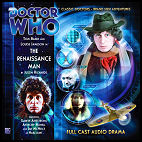 The Doctor promises to show Leela a museum on another world, but the TARDIS lands at a destination that seems anything but otherworldly. A pleasant professor shows off her butterfly knowledge to the time travelers, but before long all three are drawn into the vast library of Harcourt, a man who claims to know a little of everything – and wants to know more. It’s something he wants so badly that he’s willing to take the knowledge from the minds of others by force. When he becomes intrigued by the Doctor, it’s a meeting of the minds that the Time Lord and his companion will be lucky to survive.
The Doctor promises to show Leela a museum on another world, but the TARDIS lands at a destination that seems anything but otherworldly. A pleasant professor shows off her butterfly knowledge to the time travelers, but before long all three are drawn into the vast library of Harcourt, a man who claims to know a little of everything – and wants to know more. It’s something he wants so badly that he’s willing to take the knowledge from the minds of others by force. When he becomes intrigued by the Doctor, it’s a meeting of the minds that the Time Lord and his companion will be lucky to survive.
written by Justin Richard
directed by Ken Bentley
music by Jamie RobertsonCast: Tom Baker (The Doctor), Louise Jameson (Leela), Ian McNeice (Harcourt), Gareth Armstrong (Jephson), Anthony Howell (Edward), Daisy Ashford (Lizzie), Laura Molyneux (Beryl / Professor Hilda Lutterthwaite), John Dorney (Dr. Henry Carnforth)
Timeline: after The Talons Of Weng-Chiang; after Destination Nerva and before The Wrath Of The Iceni
Notes: Ian McNiece guest starred in the eleventh Doctor’s first television season as Winston Churchill. Gareth Armstrong guest-starred alongside Tom Baker in TV Doctor Who also, as Count Giuliano in 1976’s Masque Of Mandragora. Anthony Howell has also appeared in Big Finish’s fourth Doctor Lost Stories adventure The Valley Of Death, and the Blake’s 7 Liberator Chronicles audio story Solitary.
LogBook entry and TheatEar review by Earl Green
Review: A step up from Destination Nerva, Renaissance Man still isn’t quite an original SF story (it’s not even really original in Doctor Who circles – had it been broadcast, Shada would’ve beaten this story to its central plot twist by many a year), but thanks to some good guest actors, it’s at least entertaining.
Ian McNiece, who had shown up as recently as the finale of the 2011 season of TV Doctor Who, is an inspired choice as Harcourt, and without the characterization bear-trap of having to play a hip, modernized version of a historical character, he steals the show handily. The regulars both ham it up a bit, making Renaissance Man feel more in line with the BBC Audio Paul Magrs fourth Doctor stories, but the entire script has a bit of a sense of “heightened reality” to it that lends itself to that. The only problem there is that some of the guest players, Laura Molyneux in particular, turn in more naturalistic performances that make the difference a bit jarring.
There’s a momentary brush with an idea that Leela can discern someone’s murderous intentions because it takes a killer to know a killer, but it isn’t explored in very much depth.
The two-part format is still a bit of a problem here, but Renaissance Man feels less rushed overall than Destination Nerva did. It feels like a two-parter that isn’t struggling to jam a four-parter worth of story into the bag – rather like The Sontaran Experiment, it’s a two-parter constructed as a two-parter from the start.
